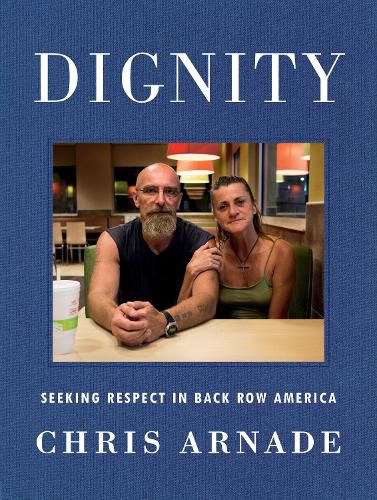Readings Newsletter
Become a Readings Member to make your shopping experience even easier.
Sign in or sign up for free!
You’re not far away from qualifying for FREE standard shipping within Australia
You’ve qualified for FREE standard shipping within Australia
The cart is loading…






Widely acclaimed photojournalist Chris Arnade shines new light on America’s poor, drug-addicted, and forgotten - both urban and rural, blue state and red state - and indicts the elitists who’ve left them behind.
Once or twice a generation, an author reveals what life is like for the truly needy and disenfranchised. Like Jacob Riis in the 1890s, Walker Evans in the 1930s, or Michael Harrington in the 1960s, Chris Arnade cuts through the jargon and abstractions to expose the reality of our current class divide in stark pictures and unforgettable true stories.
After abandoning his Wall Street career, Arnade decided to document poverty and addiction in the Bronx, spending years interviewing, photographing, and becoming close friends with homeless addicts, hanging out in drug dens and McDonald’s in the South Bronx. Then he started driving across America to see how the rest of the country compared. He found the same types of stories everywhere, across lines of race, ethnicity, religion, and geography.
The people he got to know, from Alabama to California and Maine to Nevada, gave Arnade a new respect for the dignity and resilience of what he calls America’s Back Row-those who lack the credentials and advantages of the Front Row. The strivers in the Front Row, with their advanced degrees and upward mobility, see the Back Row’s forms of meaningas worthless, and then tell them they are wasting their time staying in dying towns or cities. Why not move for better jobs?
The responses from the Back Row-about the comforts of faith, community, family, and tradition-are seen as backward. But the Back Row finds love, companionship, and dignity in surprising places-in drug dens, community colleges, churches, and even in McDonald’s. In Arnade’s pictures and writings, the suffering and flawed are also seen searching for dignity in the midst of loss and humiliation.
As Takeesha, a woman in Hunts Point, told Arnade, she wants the secular elites to see her as she sees herself- a prostitute, a mother of six, and a child of God. This book is his attempt to help the rest of us truly see, hear, and respect millions of people who’ve been left behind.
$9.00 standard shipping within Australia
FREE standard shipping within Australia for orders over $100.00
Express & International shipping calculated at checkout
Widely acclaimed photojournalist Chris Arnade shines new light on America’s poor, drug-addicted, and forgotten - both urban and rural, blue state and red state - and indicts the elitists who’ve left them behind.
Once or twice a generation, an author reveals what life is like for the truly needy and disenfranchised. Like Jacob Riis in the 1890s, Walker Evans in the 1930s, or Michael Harrington in the 1960s, Chris Arnade cuts through the jargon and abstractions to expose the reality of our current class divide in stark pictures and unforgettable true stories.
After abandoning his Wall Street career, Arnade decided to document poverty and addiction in the Bronx, spending years interviewing, photographing, and becoming close friends with homeless addicts, hanging out in drug dens and McDonald’s in the South Bronx. Then he started driving across America to see how the rest of the country compared. He found the same types of stories everywhere, across lines of race, ethnicity, religion, and geography.
The people he got to know, from Alabama to California and Maine to Nevada, gave Arnade a new respect for the dignity and resilience of what he calls America’s Back Row-those who lack the credentials and advantages of the Front Row. The strivers in the Front Row, with their advanced degrees and upward mobility, see the Back Row’s forms of meaningas worthless, and then tell them they are wasting their time staying in dying towns or cities. Why not move for better jobs?
The responses from the Back Row-about the comforts of faith, community, family, and tradition-are seen as backward. But the Back Row finds love, companionship, and dignity in surprising places-in drug dens, community colleges, churches, and even in McDonald’s. In Arnade’s pictures and writings, the suffering and flawed are also seen searching for dignity in the midst of loss and humiliation.
As Takeesha, a woman in Hunts Point, told Arnade, she wants the secular elites to see her as she sees herself- a prostitute, a mother of six, and a child of God. This book is his attempt to help the rest of us truly see, hear, and respect millions of people who’ve been left behind.